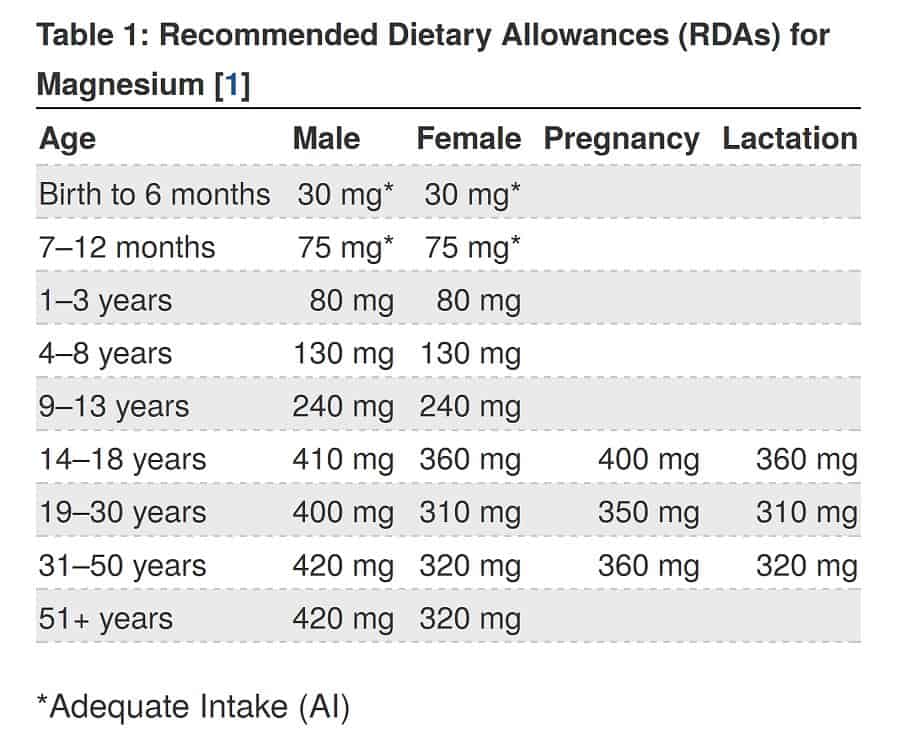The Importance Of Magnesium, Risks Of Consuming Too Little, And Natural Dietary Sources
Magnesium is one of 15 minerals that are considered essential nutrients for humans. (The others are calcium, chloride, chromium, cobalt, copper, iodine, iron, manganese, molybdenum, potassium, phosphorus, selenium, sodium, and zinc).
In fact, we need to consume it in large amounts, which means at least 100 mg per day, making it one of the so-called macrominerals.
It is also an electrolyte (i.e., a substance that conducts electricity when dissolved in water), which is another crucial requirement for life.
What Is Magnesium Used For?
Magnesium is used in anywhere from 300 – 600 biochemical reactions throughout our body (depending on whom you ask), which means it’s extremely important.
An adequate supply of magnesium can help with:
- Controlling blood pressure
- Contracting muscles
- Creating bone
- Easing symptoms of PMS / PMT (e.g., cravings, fluid retention, tenderness)
- Forming proteins
- Generating DNA
- Improving working memory capabilities
- Increasing sleep quality
- Inhibiting blood clots
- Maintaining genes
- Managing blood sugar levels
- Metabolizing food
- Transmitting nerve impulses
- Reducing headaches and migraines
- Regulating moods
- Relieving symptoms of mental illnesses (e.g., anxiety, depression, stress)
- Supporting a healthy brain function
- Synthesizing fatty acids
How Much Magnesium Do You Need?
The following chart is taken from the National Institutes Of Health:

Note the increased requirements for women who are pregnant or lactating.
Magnesium Depletion
Unfortunately, it is estimated that at least 50% of people in the USA (and in Europe) are deficient in this essential nutrient, and there are several possible reasons for this:
- Chemicals such as chlorine and fluoride in the water supply can make magnesium less available.
- Chronic stress has been shown to reduce magnesium levels. (And long-term stress is believed to affect a significant percentage of people – maybe over 50%.)
- Consuming too much sugar can deplete your body’s magnesium. (It can also lower levels of calcium, chromium, vitamin C, and vitamin D.)
- Drinking alcohol or carbonated beverages (e.g., soda) can make any magnesium less bioavailable. These liquids can also lead to your kidneys excreting this mineral before your body has a chance to absorb it.
- Magnesium levels in soil are declining, with potential causes being heavy rains and monoculture (i.e., planting the same crop in the soil year after year, instead of rotating different crops).
- Marijuana use (especially over long periods of time).
- Plants are less able to absorb such nutrients because of the use of herbicides such as glyphosate.
- Prescription drugs can reduce your body’s ability to absorb magnesium. These include acid reflux medications, antibiotics, diuretics, and some osteoporosis drugs such as bisphosphonates.
- Soft water, which is low in minerals. (By contrast, some people where hard water is prevalent can obtain at least half of their daily magnesium requirement purely from their drinking water.)
- Taking calcium supplements can reduce the amount of magnesium in your body. Historically, calcium and magnesium have been consumed in roughly equal quantities, but today’s diet contains about ten times more calcium than magnesium. (Ironically, many people take calcium supplements for bone health, but magnesium actually plays a greater role in maintaining healthy bones than calcium does.)
- The standard American diet does not include magnesium-rich food.
Certain groups of people are more at risk of magnesium deficiency than others, such as people with:
- Chronic alcoholism.
- Gastrointestinal diseases (e.g., celia, Crohn’s).
- Type 2 diabetes.
Older people are also at higher risk.
Symptoms Of Magnesium Deficiency
A deficiency of magnesium can lead to, or is associated with:
- Abdominal pain
- ADD / ADHD
- Adrenal fatigue
- Aggression
- Anger
- Anxiety
- Anxiety disorders (e.g., OCD)
- Asthma
- Ataxia
- Atrial fibrillation
- Behavioural disturbances
- Brain fog / confusion
- Chronic back pain
- Constipation
- Depression (A randomized controlled trial involving older adults suffering from depression found that a 450 mg magnesium supplement improved their mood as effectively as an antidepressant drug.)
- Diabetes
- Epilepsy
- Fatigue (including chronic fatigue syndrome)
- Fibromyalgia
- Headaches
- Heart disease
- Heart palpitations
- High blood pressure (aka hypertension)
- Hormone problems
- Impaired memory / thinking
- Insomnia
- Kidney stones
- Lethargy
- Migraines
- Muscle cramps
- Muscular pain
- Neuro-vegetative disorders
- Osteoporosis
- Pain
- Parkinsonism
- Preeclampsia
- Seizures
- Sleep disturbances
- Tendonitis
- Tension
- Tinnitus
- Tremors
Natural Sources Of Magnesium
This essential mineral can be found in the following foods:
- Almonds
- Avocado
- Bananas
- Beet greens
- Beans (e.g., black, kidney, lima)
- Bran cereal
- Brazil nuts
- Broccoli
- Brown rice
- Cacao / cocoa
- Cashew nuts
- Chicken (e.g., breast)
- Coffee (but be aware that caffeine consumption should be moderate, at best)
- Dark chocolate
- Figs
- Grass-fed dairy
- Hazelnuts
- Macadamia nuts
- Oatmeal
- Peanuts (including peanut butter)
- Pecan nuts
- Pink salts (e.g., Himalayan)
- Pistachio nuts
- Potatoes (with their skins)
- Raisins
- Sea vegetables (e.g., dulse, nori, kelp)
- Seeds (e.g., flax, pumpkin, squash)
- Spinach
- Sprouts (e.g., broccoli, cauliflower, kale)
- Swiss chard
- Walnuts
- Whole grain bread
- Wild-caught (i.e., not farmed) fish (e.g., halibut, Alaskan salmon, sardines)
- Yoghourt
Other Ways To Supplement Your Magnesium Intake
There are a few other, non-dietary methods of obtaining your magnesium, including:
- Epsom salt baths.
- Ionic magnesium drops.
- Magnesium supplements (although absorption from pills is minimal). There are many different types of magnesium supplements, some of which are better for certain symptoms than others, so I would recommend checking out this article, which goes into much more detail.
- Topical magnesium oil.
If you can, the general consensus is that you should take your magnesium supplement with food, and spread out over the course of the day.
In addition, vitamin D may help your body absorb more of the magnesium. (You can obtain vitamin D either from your diet, via foods such as cheese and eggs, or by spending time in sunlight. Failing that, vitamin D3 supplements are another option.)
Symptoms Of Too Much Magnesium
It might be difficult to consume too much through your diet, but it is possible to overdose on it via supplements.
Some of the most common signs that you may have too much magnesium in your body include:
- Abdominal cramping
- Diarrhoea
- Irregular heartbeat and/or cardiac arrest
- Nausea
Remember the usual warning here – these signs, individually or in combination, do not necessarily mean you have an excess of magnesium. However, and especially if you are taking magnesium supplements, you may want to consult your doctor about it and get them to do a blood test (which is the only reliable way to accurately assess magnesium levels).
Conclusion
Magnesium is crucial for so many functions within our body, and yet so many people are deficient in it.
Given its importance, it makes sense to do whatever you can to ensure you obtain the recommended amount, every single day.
Between eliminating unhealthy foods, increasing consumption of magnesium-rich foods, and supplementing with sprays or drops, for example, there are plenty of options to optimize your magnesium levels and take a positive step toward better physical and mental health.
Additional Resources
These are suggestions for those who wish to delve deeper into any of the above:







